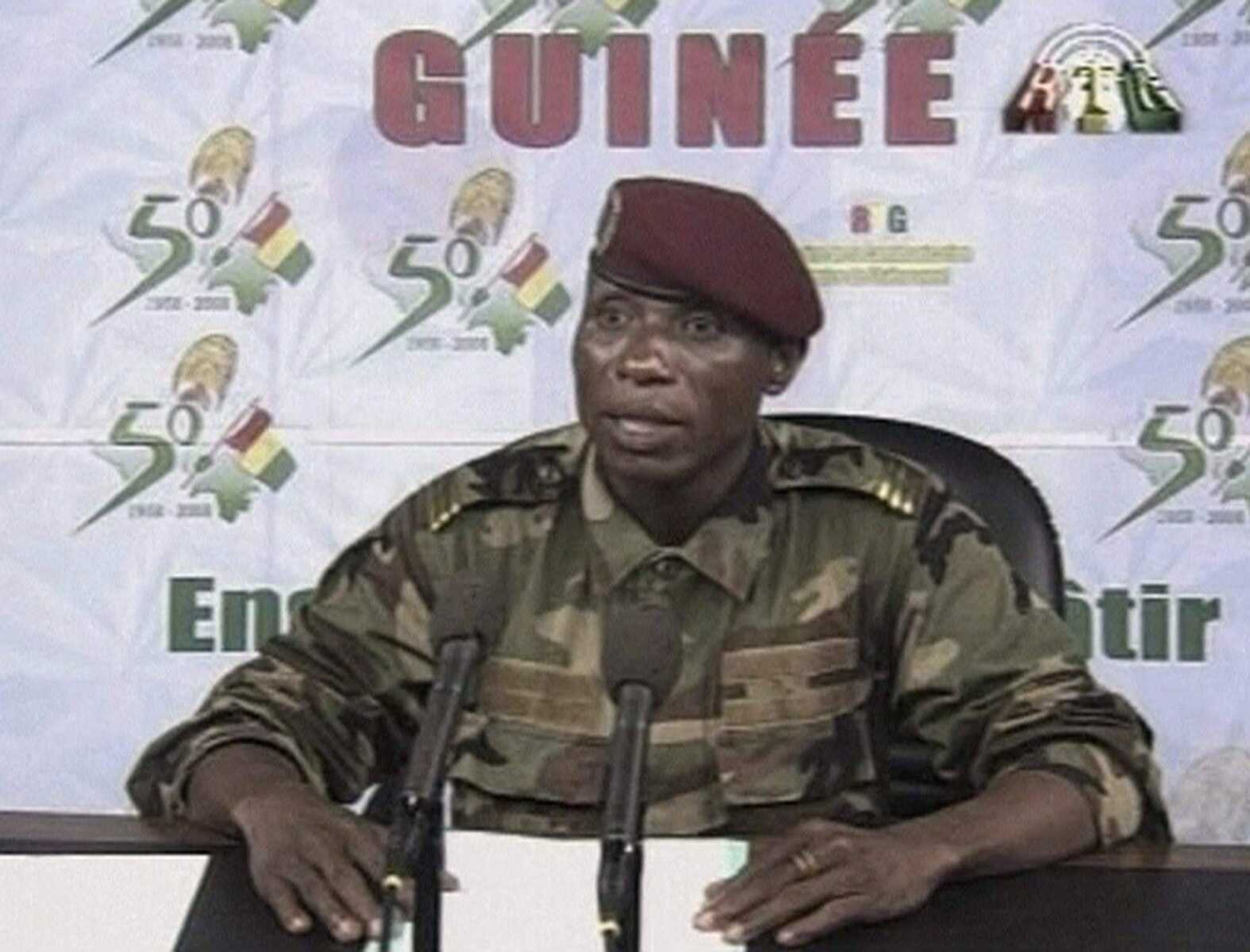Guinea coup leader solidifies his hold over nation
CONAKRY, Guinea -- Guinea's coup leader solidified his hold over this impoverished West African nation Thursday as the prime minister who served under its late dictator surrendered and stepped down along with dozens of other government leaders. While some welcomed new military leader Capt. Moussa Camara as a break with the past, others worried he will try to cling to power like the strongman whose death this week touched off the political crisis...
CONAKRY, Guinea -- Guinea's coup leader solidified his hold over this impoverished West African nation Thursday as the prime minister who served under its late dictator surrendered and stepped down along with dozens of other government leaders.
While some welcomed new military leader Capt. Moussa Camara as a break with the past, others worried he will try to cling to power like the strongman whose death this week touched off the political crisis.
Camara had ordered Prime Minister Ahmed Tidiane Souare and other leaders of Guinea's government and armed forces to come out of hiding and turn themselves in at a military barracks within 24 hours. If they did not, he threatened to organize a nationwide search for them.
Souare's mother, Aissatou, said her son was no longer prime minister and that he and the other ministers went to the barracks to avoid being hunted down.
Private radio station Liberte FM carried a live broadcast of him telling the coup leader: "We are at your disposal," in an apparent capitulation. The radio station reported Camara said the government leaders were then free to leave, but it was not immediately clear where they were.
Later in the day, the head of all armed branches of Guinea's military, Gen. Camara Diarra, also turned himself in at the barracks, as did the head of police and the head of customs.
Souare had not been seen in public since Camara's group of junior officers declared a coup Tuesday, though he had claimed a day later to be still in control. Souare served under Lansana Conte, the country's longtime dictator who died Monday after nearly a quarter-century in power.
Camara has declared himself Guinea's interim leader and pledged to hold a presidential election in two years.
But many in the international community say that is too long to wait.
The European Union urged Guinea to hold "democratic and transparent" elections within the first three months of 2009.
French President Nicolas Sarkozy's office said France is "extremely worried" about the situation in Guinea. The statement said free, fair elections "should be organized in a short time and under international observation." It urges a "peaceful, orderly and democratic transition."
In radio broadcasts Thursday, Camara said he had no intention of being a candidate in the December 2010 vote but that his group wants to re-establish order and crack down on corruption.
"I want to warn anyone who thinks they can try to corrupt me or my agents. Money is of no interest to us," Camara said. "There are already people who are starting to show up with bags of money to try to corrupt us. They've tried to give money to our wives and cars to our children. I will personally go after anyone who tries to corrupt us."
Under Guinea's constitution, parliament leader Aboubacar Sompare was next in line to be president. Sompare's whereabouts on Thursday were not known.
Some in Conakry said they were ready for a change from the previous regime.
On Wednesday, throngs of people lined Conakry's streets to cheer Camara on as he led a military convoy parade to the presidential palace.
But in northern Guinea, about 500 miles from the capital, others expressed concerns about Camara's group, which initially had said it would hold elections within 60 days.
"We are all worried. Although I'm a little bit happy, I'm mostly anxious," said Yahya Sako, a radio and TV repairman in the town of Siguiri. "Are these military people going to continue to hold on to power?"
Until Conte's death, Guinea had been ruled by only two people since its 1958 independence from France. Conte first took power in a 1984 military coup after his predecessor's death, embarking on more than two decades of stern-handed, dictatorial rule.
He won presidential elections in 1993, 1998 and 2003, but the ballots were marred by accusations of fraud. In 2003, Conte secured 95 percent of the vote -- an improbably high tally for a man many say was deeply unpopular.
Camara promised a "grandiose funeral" for Conte on Friday. He died Monday but there has been no funeral despite Muslim custom calling for burial within 24 hours of death.
"How can you leave the body of a president like that without taking care of it?" Camara said. "I saw the body. It's not been treated. It leaves you to think we don't have a single ice room in all of Guinea."
Conte's body was to be brought to a Conakry stadium Friday morning and to the Grand Mosque before interment. Camara's group said it would ensure the security of visiting foreign heads of state and dignitaries who want to attend the funeral.
Guinea is the world's largest producer of bauxite, used to produce aluminum, and has gold, diamond and iron ore deposits. The nation, located at the confluence of several West African rivers, could generate enough electricity to power the region, some analysts say.
But Guinea's economy has rapidly deteriorated, and its 10 million people are among the world's poorest. A food exporter at independence from France, Guinea started importing food as it became crippled by corruption, inflation and high unemployment.
------
Associated Press writers Maseco Conde in Conakry, Guinea and Angela Charlton in Paris contributed to this report. Callimachi contributed from Siguiri, Guinea.
Connect with the Southeast Missourian Newsroom:
For corrections to this story or other insights for the editor, click here. To submit a letter to the editor, click here. To learn about the Southeast Missourian’s AI Policy, click here.









